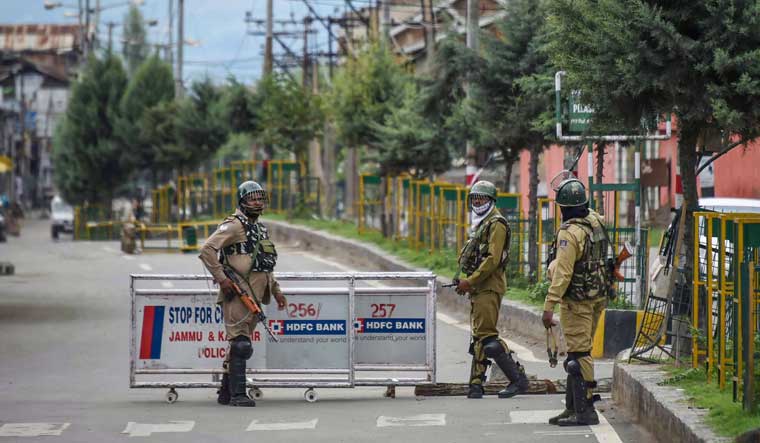In an event of far-reaching consequences, the state of Jammu and Kashmir ceased to exist at midnight Wednesday and was converted into two union territories, 86 days after Parliament abrogated its special status under Article 370.
The UTs of Jammu and Kashmir, and Ladakh will be headed by lieutenant governors G.C. Murmu and R.K. Mathur. They will take oath today.
ALSO READ
- Migrant labourer from Bihar shot dead by terrorists in J&K
- Ghulam Nabi Azad not to contest Lok Sabha polls from Anantnag-Rajouri
- Lok Sabha polls: Will BJP skip fielding candidates in Kashmir?
- Jhelum boat tragedy: Death toll rises to 6, rescue ops underway
- J&K: Boat capsizes in Jhelum river, 4 dead
- Lok Sabha polls: NC fields Omar Abdullah from Baramulla, Agha Ruhullah Mehdi from Srinagar
- J&K will get statehood soon; dare Congress to bring back Article 370: PM Modi
- 'Unchecked development in Ladakh will turn locals into refugees': Sonam Wangchuk to THE WEEK
This is the first time that a state is being converted into two UTs. The total number of states in the country will now be 28, while the total UTs will go up to nine.
The swearing-in ceremony will be first held in Leh where Mathur would be administered oath of office followed by that of Murmu in Srinagar.
With this, the Constitution of Jammu and Kashmir will cease to exist from Thursday, when the nation celebrates 'National Unity Day' to mark the birth anniversary of the country's first home minister Sardar Vallabhbhai Patel, who is credited for the merger of over 560 states into the Union of India.
The secretariat in Srinagar will close on October 25, and will reopen in Jammu on November 4, when it will no longer be the administrative seat of the undivided state. ‘’The transformation will be slow, but steady,’’ said a senior official in Delhi. On October 31, the government will set in motion the reorganisation of the state through a division of assets including the bureaucracy, government offices, courts, schools and colleges, and will declare the capital cities of the new Union territories. The criminal jurisprudence system, too, will undergo a change with the Ranbir Penal Code being replaced by the Code of Criminal Procedure and the Indian Penal Code.
The government has got two months to roll out its roadmap, which will include short- and long-term goals to address immediate problems and chart out the future course. The first discussion on this roadmap took place on August 19, when national security adviser Ajit Doval met Union Home Minister Amit Shah and shared feedback about his interactions with local people. Jammu and Kashmir chief secretary B.V.R. Subrahmanyam, and governor’s advisers K.K. Sharma, K. Skandan and K. Vijay Kumar are also involved in assessing people’s grievances and suggesting confidence-building measures.
Government sources said a special assistance package was being considered to jumpstart developmental work in the two Union territories. The bigger challenge, however, would be to deliver on these promises that are closely intertwined with the government’s decision to treat the new Union territories at par with other states. The package is expected to focus on power projects for Jammu and Kashmir, solar projects for Ladakh, building of roads, railways and highways and health care facilities for women and children.
Both Murmu and Mathur will be sworn-in by Chief Justice of the Jammu and Kashmir High Court Gita Mittal.
The Jammu and Kashmir Reorganisation Act, 2019, states that the appointed day for the two UTs is October 31 and these will come into existence in the midnight (Wednesday-Thursday).
The announcement of abrogation of the state's special status and its bifurcation was made in Rajya Sabha on August 5.
The UT of Jammu and Kashmir will have a legislature like Puducherry while Ladakh will be a UT without legislature like Chandigarh and both the UTs will be headed by two separate lieutenant governors (LG), as per the Act.
The Centre will be in direct control of the police and the law and order in Jammu and Kashmir from Thursday when it becomes a UT, while the land will be under the elected government there.
The UT of Ladakh will be under the direct control of the central government which will administer the high-altitude region through the LG.
Senior IAS officer Umang Narula was appointed advisor to Ladakh's Lt Governor and S S Khandare police head of the UT.
-Inputs from PTI, Namrata Biji Ahuja


